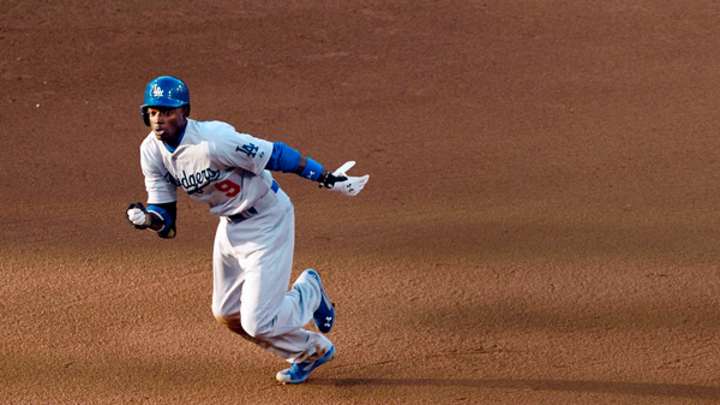Catch Dee Gordon If You Can!

As with many pitchers these days, Kansas City Royals righty James Shields found himself at the mercy of Dee Gordon's speed. Shields, who owns one of the best pickoff moves in baseball, had just given up a single to Gordon, the instinctive and gutsy L.A. Dodgers second baseman, in the fifth inning of a game in June. The two locked eyes and anticipated each other's next move, but Gordon was too quick for Shields. In a dizzying blur, Gordon sprinted toward second as Shields began his delivery and slid in safely for his major league-leading 40th steal.
"There's no better feeling than staring down a pitcher who wants to catch you, but instead, you beat him," Gordon says.
Gordon has begun to revel in this type of satisfaction. After battling his way into the starting lineup, Gordon has become an impact player on a squad bursting with stars. While teammates like slugger YasielPuig and flamethrower Clayton Kershaw change games with one swing or pitch, Gordon's swiftness on the base paths makes him influential.
"Nobody changes the complexion of a game as quickly as Dee does when he gets on first," Dodgers first base coach Davey Lopes says. "Dee puts a tremendous amount of pressure on the pitcher and the defense. He causes so many problems for the other team. It's the type of trouble that helps us score and win."
Natural Born Fighter
Gordon's journey to becoming a master of stolen bases began with a struggle. The 26-year-old son of Tom (Flash) Gordon, who played 21 seasons in the majors as a relief pitcher, was born two months premature, weighing only four pounds, two ounces. When Gordon was six, his mother died.
"I almost didn't make it. I had to fight to live when I was a baby," he says. "And then I lost my mom at such a young age; it all just made me fight to become who I am today."
After his mother's death, Gordon was raised by his father and grandmother in Florida and found refuge in basketball. He modeled his game after quick, high-scoring NBA guard Allen Iverson. That is, until Gordon's father, a three-time MLB All-Star, urged his son to consider a future in baseball.
"I thought my dad was crazy. He'd seen me in a basketball jersey since I could walk, and I thought, 'Now he wants me to play baseball?' " Gordon says. "But I gave it a chance."
Gordon was a late bloomer and didn't play organized baseball until he was 16. After graduating from high school, Gordon honed his baseball chops playing shortstop at Southeastern University and Seminole Community College. Scouts took notice, and Gordon was drafted by the Dodgers in the fourth round of the 2008 MLB draft.
As fast as Gordon is, success at the pro level didn't come overnight. He had to fight for that too.
Gaining Ground
In June 2011, Gordon, who had been named the Dodgers' Minor League Player of the Year in '09, was called up to fill in for injured shortstop Rafael Furcal. A month after his debut, Gordon showcased his warp speed against the Angels, stealing second, third, and home in the same inning. He hit .304 and stole 24 bases in 56 games that season.
In 2012, an injury and inconsistencies started to hamper Gordon's budding career. He was leading the National League in steals with 30 in 78 games when he tore a ligament in his thumb. During Gordon's rehab stint, the Dodgers acquired shortstop Hanley Ramirez. By the time Gordon returned, he was out of a starting job and demoted to pinch runner, finishing the season with a .228 batting average and 32 stolen bases. He bounced between the minors and the Dodgers in 2013, batting .234 and swiping 10 bases in only 38 games with L.A.
Gordon was beginning to look like a bust. "It was hard coming to the ballpark knowing that I wasn't going to play or would have a limited role, even though I knew I was good enough to play," he recalls.
Gordon closed out the 2013 season playing winter ball in the Dominican Republic and Puerto Rico. He tried center field at the request of the Dodgers and then switched to second base in a scramble to find a suitable position that would keep him on the roster. The relatively scrawny, 5′ 11″ Gordon dedicated himself to getting bigger and stronger. "Going into the offseason, I was 152 pounds. By the end of the offseason I was 173," Gordon says. "I ate everything. I had a lot of protein shakes, double cheeseburgers, and fries. Sometimes I'd have two sandwiches as a snack."
Gordon didn't enjoy the all-you-can-eat routine. "The first week, I almost threw up every day," Gordon says. "I was nervous. I didn't know how fast I was going to be [with the extra weight]."
It takes Gordon 3.7 seconds to reach first base — around 0.6 of a second faster than the average big leaguer — so there are no signs that the added pounds have slowed him down. And now that he's bulkier, he's hitting the ball better; his slugging percentage has improved more than 100 points from last year, to .416.
"He's not just stealing bases. He gets on base and makes things happen. On top of that, he's playing Gold Glove defense for us," Dodgers center fielder Matt Kemp says. "I don't know where we would be without him."
Photo: Robert Beck/Sports Illustrated, Twitter


